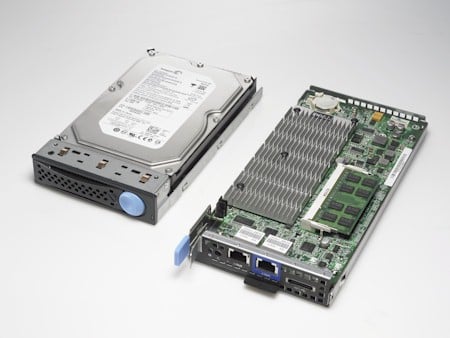Dell and Via are teaming up to provide low power servers. Computerworld writes.
Dell uses Via Nano laptop chips in servers
Subscribe to this podcast in iTunes!
Dell's new ultra-light server will use low-power processors designed for use in cheap laptops. The XS11-VX8 servers will use Nano netbook processors from Via Technologies to run light server workloads such as Web hosting. Dell's move to use the Nano chips is part of a growing trend to use low-power chips in servers to reduce energy and cooling costs in data-centers. The Dell servers will be priced at around 400 dollars and will bundle 12 server boards with Nano chips in one chassis. Each server board will include Via's Nano U2250 processor, which runs at 1.3GHz, and a storage module.
interesting that Dell has 12 server boards per chassis. Given the competition for market share i wonder if Dell will count a XS11-VX8 as one or twelve servers?
Why would Dell create these low power, low performance servers?
The Register gives a reason.
In the Web hosting world, you can charge a premium for customers who have dedicated servers. But Moore's Law and every-more powerful processors combined with server virtualization puts pressure on Web hosting companies to do shared servers for their clients because no modest Web customer can use a whole one-socket or two-socket server today. What's a Web hosting company trying to make profit to do?
Buy servers using physically smaller and less powerful servers, of course.
And that is just what Dell's Data Center Solutions unit, which creates and sells custom-designed server platforms for hyperscale clients, wants to sell to hosting companies. According to Drew Schulke, product marketing manager for the DCS unit, five hosting providers approached Dell because they wanted the option of providing customers with smaller physical servers, perfectly capable of handling Web hosting workloads and not depending on virtualization. Schulke says that the number of machines that these companies have already deployed and their plans to offer dedicated hosting were sufficient to justify investing in custom server designs.
This is exactly the opposite (anti) of what Intel and VMware want the industry to go.
Dell looked around at Intel's Atom processor as well as a few others, but VIA Technologies' Nano processor is the only one of the low-power x64 chips that has the option of supporting virtualization through its VMX virtualization extensions. It isn't so much that these hosting companies want to be able to use virtualization to carve up these servers as it is they want to use virtualization to be able to manage the server image on a dedicated machine. You can't use Xen or KVM - as two early customers for the VIA boxes plan to - to package up a server image on an Atom processor because it does not support Intel's VT instructions.
The Dell DCS VIA server versus a disk
drive (Click to Enlarge)Dell took the Nano chip and chipset and worked with VIA and an unnamed original design manufacturer to create what it calls a "hot plug server" based on a modified version of VIA's Nano processor and its similarly named motherboard. Using a 1.6 GHz Nano processor and the Dell XS11-VX8 server module, which is slightly longer than a 3.5-inch disk storage bay, Dell can give hosting companies a 64-bit Nano server that has from 1 GB to 3 GB of main memory and that has an idle power draw of around 15 watts and that draws somewhere between 20 and 29 watts under peak loads. That is about one-tenth the power used by a standard two-socket 1U box that is not running at a particularly high utilization.
and this continues down the idea I had on “little green servers”
Ever so slowly, the idea of modest computing - using Moore's Law to make smaller and more energy efficient computers, not boosting component counts - seems to be starting to cache on. Just last week, motherboard and whitebox server maker Super Micro announced a server based on the Atom chip. And back in January, Rackable Systems adopted Mini-ITX boards from VIA for use in its MicroSlice rack servers, and Microsoft has been tooling around with the concept too. ®
